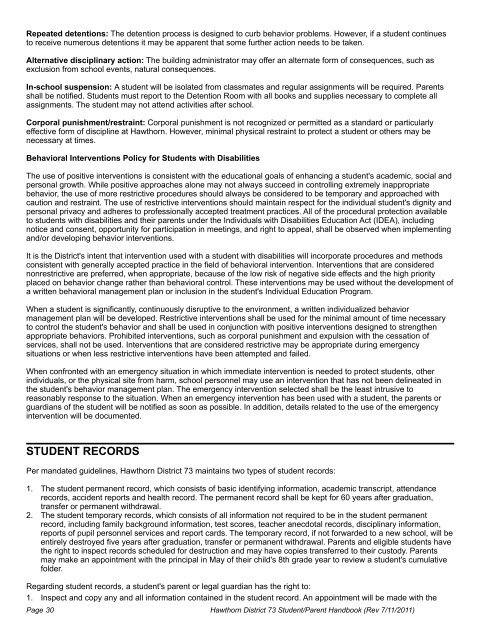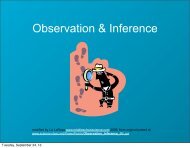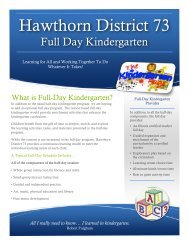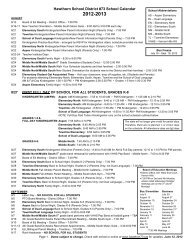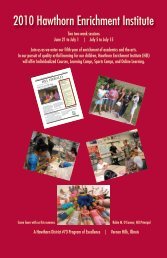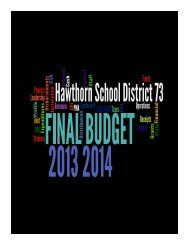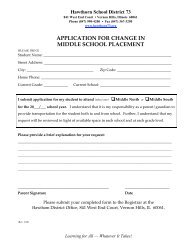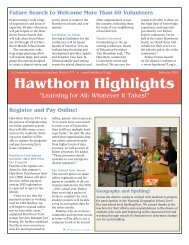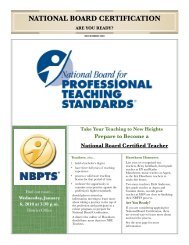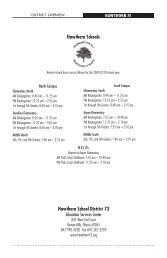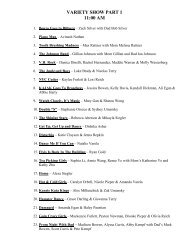Student/Parent Handbook - Hawthorn School District 73
Student/Parent Handbook - Hawthorn School District 73
Student/Parent Handbook - Hawthorn School District 73
You also want an ePaper? Increase the reach of your titles
YUMPU automatically turns print PDFs into web optimized ePapers that Google loves.
Repeated detentions: The detention process is designed to curb behavior problems. However, if a student continues<br />
to receive numerous detentions it may be apparent that some further action needs to be taken.<br />
Alternative disciplinary action: The building administrator may offer an alternate form of consequences, such as<br />
exclusion from school events, natural consequences.<br />
In-school suspension: A student will be isolated from classmates and regular assignments will be required. <strong>Parent</strong>s<br />
shall be notified. <strong>Student</strong>s must report to the Detention Room with all books and supplies necessary to complete all<br />
assignments. The student may not attend activities after school.<br />
Corporal punishment/restraint: Corporal punishment is not recognized or permitted as a standard or particularly<br />
effective form of discipline at <strong>Hawthorn</strong>. However, minimal physical restraint to protect a student or others may be<br />
necessary at times.<br />
Behavioral Interventions Policy for <strong>Student</strong>s with Disabilities<br />
The use of positive interventions is consistent with the educational goals of enhancing a student's academic, social and<br />
personal growth. While positive approaches alone may not always succeed in controlling extremely inappropriate<br />
behavior, the use of more restrictive procedures should always be considered to be temporary and approached with<br />
caution and restraint. The use of restrictive interventions should maintain respect for the individual student's dignity and<br />
personal privacy and adheres to professionally accepted treatment practices. All of the procedural protection available<br />
to students with disabilities and their parents under the Individuals with Disabilities Education Act (IDEA), including<br />
notice and consent, opportunity for participation in meetings, and right to appeal, shall be observed when implementing<br />
and/or developing behavior interventions.<br />
It is the <strong>District</strong>'s intent that intervention used with a student with disabilities will incorporate procedures and methods<br />
consistent with generally accepted practice in the field of behavioral intervention. Interventions that are considered<br />
nonrestrictive are preferred, when appropriate, because of the low risk of negative side effects and the high priority<br />
placed on behavior change rather than behavioral control. These interventions may be used without the development of<br />
a written behavioral management plan or inclusion in the student's Individual Education Program.<br />
When a student is significantly, continuously disruptive to the environment, a written individualized behavior<br />
management plan will be developed. Restrictive interventions shall be used for the minimal amount of time necessary<br />
to control the student's behavior and shall be used in conjunction with positive interventions designed to strengthen<br />
appropriate behaviors. Prohibited interventions, such as corporal punishment and expulsion with the cessation of<br />
services, shall not be used. Interventions that are considered restrictive may be appropriate during emergency<br />
situations or when less restrictive interventions have been attempted and failed.<br />
When confronted with an emergency situation in which immediate intervention is needed to protect students, other<br />
individuals, or the physical site from harm, school personnel may use an intervention that has not been delineated in<br />
the student's behavior management plan. The emergency intervention selected shall be the least intrusive to<br />
reasonably response to the situation. When an emergency intervention has been used with a student, the parents or<br />
guardians of the student will be notified as soon as possible. In addition, details related to the use of the emergency<br />
intervention will be documented.<br />
STUDENT RECORDS<br />
Per mandated guidelines, <strong>Hawthorn</strong> <strong>District</strong> <strong>73</strong> maintains two types of student records:<br />
1. The student permanent record, which consists of basic identifying information, academic transcript, attendance<br />
records, accident reports and health record. The permanent record shall be kept for 60 years after graduation,<br />
transfer or permanent withdrawal.<br />
2. The student temporary records, which consists of all information not required to be in the student permanent<br />
record, including family background information, test scores, teacher anecdotal records, disciplinary information,<br />
reports of pupil personnel services and report cards. The temporary record, if not forwarded to a new school, will be<br />
entirely destroyed five years after graduation, transfer or permanent withdrawal. <strong>Parent</strong>s and eligible students have<br />
the right to inspect records scheduled for destruction and may have copies transferred to their custody. <strong>Parent</strong>s<br />
may make an appointment with the principal in May of their child's 8th grade year to review a student's cumulative<br />
folder.<br />
Regarding student records, a student's parent or legal guardian has the right to:<br />
1. Inspect and copy any and all information contained in the student record. An appointment will be made with the<br />
Page 30 <strong>Hawthorn</strong> <strong>District</strong> <strong>73</strong> <strong>Student</strong>/<strong>Parent</strong> <strong>Handbook</strong> (Rev 7/11/2011)


